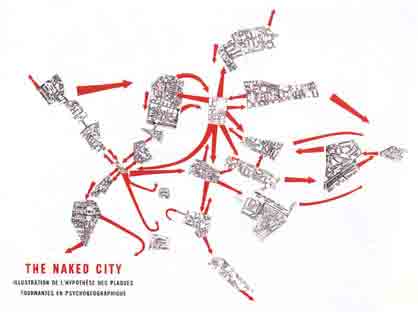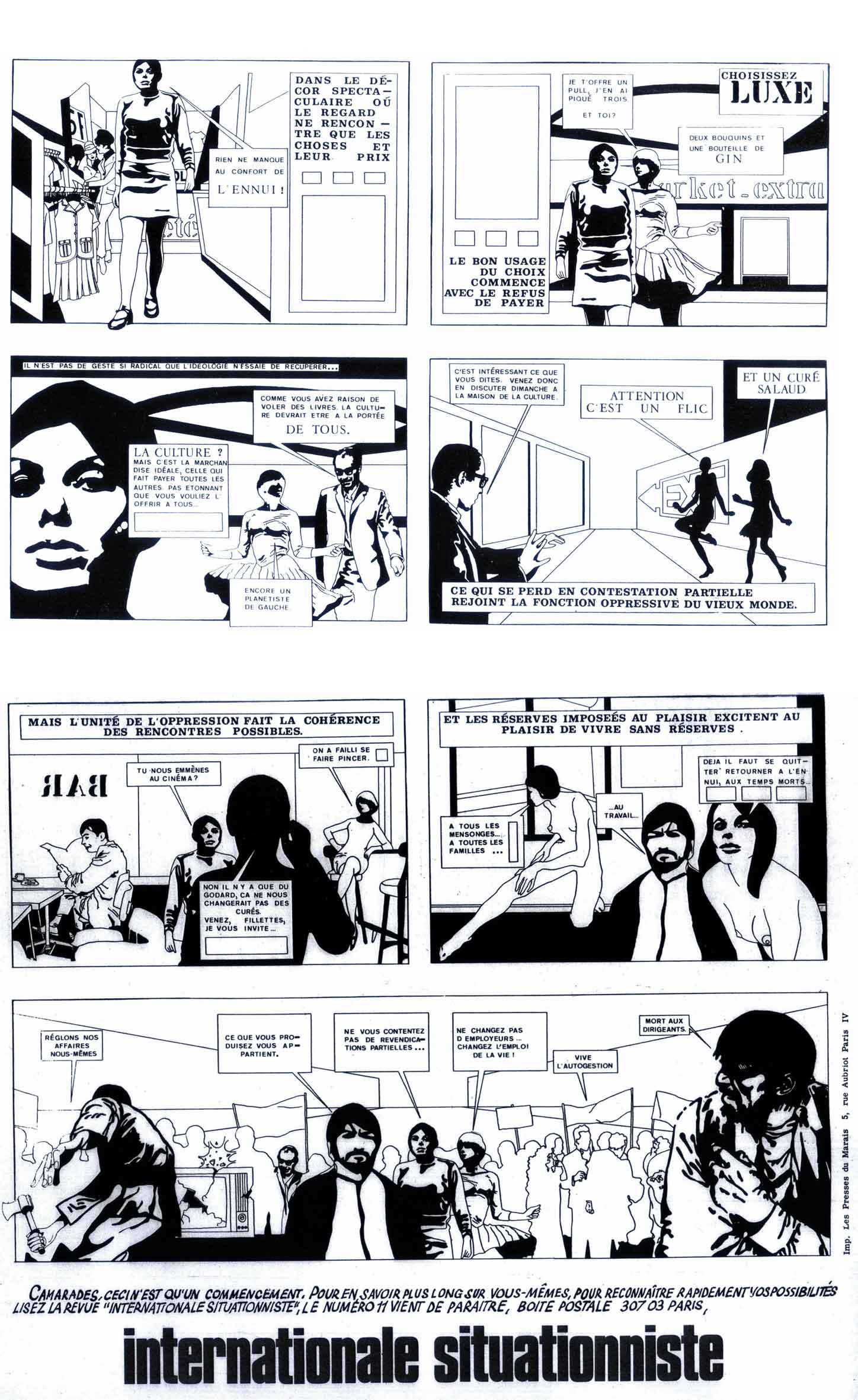pdf: the situationist international 
SamFanto note:
The following is an excerpt from Daniel Denevert’s text ‘‘Suggestions for the Legitimate Eulogy of the SI and of all Revolutionary Activity in order to Arrive at a Merciless Critique of Our Enemies” which was never published but was distributed a bit round the Situationist milieu in 1977. In the context of today’s mad capitalist emphasis of ”The Individual” (in submission to the most anti-individual hierarchical Economy) its attack on ”The Collectivity” from a revolutionary perspective might seem bizarre. However, the question it poses is essential: what and how you organise as opposed to organising the organisation.
The CRQS, which consisted of four people in Paris, stood for the “Centre for Research into the Social Question”. A few translations of their texts are available on Ken Knabb’s ‘Bureau of Public Secrets’ site:
Theory of Poverty, Poverty of Theory (Denevert, 1973)
To Clarify Some Aspects of the Moment (chapter 3) (Denevert, 1972)
Declaration Concerning the Center for Research on the Social Question (CRQS, 1974)
and these texts on this site were written by ex-members a year or so after it broke up:
all things considered (1976), reflections on subjectivism and intellectualism (1977), “from decomposition to new constructions” (1978)
Excerpt from Daniel Denevert’s text ”Suggestions for the Legitimate Eulogy of the SI and of all Revolutionary Activity in order to Arrive at a Merciless Critique of Our Enemies”:
“It is correct that the conception of the CRQS is the “consequence of a failure” and even of a series of failures. On the one hand, the failures lived by its founders, but also of the failure of tentatives of autonomous organisation encouraged by the example of the SI. The CRQS didn’t attempt to be a better organisation – it is part of the bursting of the very perspective of an autonomous revolutionary organisation (or organisations), in which I see the heritage of the model of Leninist organisation, that is to say of a bourgeois-bureaucratic conception of struggle, developed by the ensemble of the old politics.
One can say, in all rigor, that the Situationist International attempted to restore a revolutionary significance to this model, starting up again the adventure of the revolutionary Party – in the sense of Lenin and Lukacs, the organisation seen as the mediation destroying all its presuppositions (militantism, the historic mission of guiding the class to revolution and of officering it there, putting an ideology in power, etc.). The originality, but at the same time all the ambiguity, of the S.I. was in its constituting itself as a useless Party, that is to say useless in the perspective of party struggle. Which, in the context of its period, was an extremely ingenious method; which can be compared on the terrain of organisational politics with the methods of Dada on the terrain of art. But the S.I. also exposed itself as empty form, because as organisational form it didn’t really have any perspective, if not to defend for itself a place among the leaders wrangling over the ownership of the modern revolution.
“It is notorious that anarcho-situationist egalitarianism has always refused to recognise the real hierarchical organisation upon which it has functioned. The major practical evasion finally reduced the Situationists’ theory, on the question of revolutionary organisation, to being nothing but a mere counter-ideology opposed to the dominant heirarchical organisation; preferring to share the illusion and official lie of equality rather than bear the shame of its denial. Yet the possibility of effectively anticipating all the new problems while there was still time to do so (notably for the old S.I.) hinged upon the acceptance of this denial and on the theoretico-practical conclusions resulting from it.” (Theory of Misery/Misery of Theory, Daniel Denevert)
”If this epoch can now do without a Situationist International, it is because its solution depends on the fact that a situationist proletariat is going to succeed in exposing and developing itself there.” (Chronique of Public Secrets, vol.1)
“The SI did not apply itself to the extent of applying its own theory in the very activity of the formulation of that theory or in the general conditions of its struggle. The partisans of the SI’s positions have not, for the most part, been their creators or their real agents. They were only more official and more pretentious pro-situs.This is the principal failing of the SI…Not to have been aware of it was for a long time its worst error (and to speak of myself, my worst error). If this attitude had dominated, that would have been its definitive crime. As an organisation, the SI has partly failed: and precisely on this point. It was necessary therefore to apply to the SI the critique that it had applied, often so well, to the dominant society. It could be said that we were well enough organised to make our programme be visible in the world, but not our programme of organisation.” (Orientation Debate of the SI, 1969 – 1970, Guy Debord)
The autonomy of individuals has been posed as the fundamental condition of the “autonomous revolutionary organisation”, a counter-measure aimed at prohibiting the habitual relations of revolutionaries in the classical organisation. This is organisational strategy – organisational ideology – arrived at the bursting point of demanding the autonomy of its members. The individual officially desires his autonomy “for himself”, but fundamentally because it is the ultimate requirement of the ultimate possible spectacle: the spectacle of the destruction of the spectacle. It is the last condition through which organisational ideology can still think to save itself (although it thus moves towards its accelerated destruction), it is the last ruse of that conception of the world so well-embodied by Leninism. It has come to the point of demanding autonomous members, that is to say precisely individuals capable of doing without membership in an organisation. That which the organisation demands, in the interior, of its members, it must equally demand, at the exterior, of the revolutionary proletariat; it must demand that it do without the organisation; it declares itself useless; sometimes going on to pose itself, in the greatest confusion, the never resolved question of its relations “with the class”, which comprises, for example, the absurd substance and the impotence of the Orientation Debate.
The contradiction that shields the notion of autonomy is perfectly reflected in the significant expression “autonomous organisation”, which refers at one and the same time to the autnomy of the organisation, the autonomy of individuals – that is to say to their capacity in their activity to do without each other and the organisation – and to the autonomy of the organisation, i.e. to the absolute dependance of the individuals mediated by the organisation. The organisational perspective is a conception of revolutionary activity that walks on its head. The principle of organisation does not lie in a determined accord between determined activities, it does not translate the really organisable element of individuals’ acitivity, but is the inversion of this point of view: it is real and potential global activity, the very substance of individuals, working to organise the organisation. The organisational perspective precisely translates the estrangement into a spectacle of revolutionaries’ activity and their need to conserve a spectacle.
Another significant notion is that of “interior” and “exterior” that one systematically meets with in all the groups and parties. The very fact that this distinction is possible well expresses the strange autonomy of the organised individual. Regarding the banal – non-organised – individual, one would spontaneously tend to think that if he has an “exterior” it begins with the other, with the objective world. That is to say that this notion translates the fundamental relation of the individual to the world and his own activity, the point of view of his own subjectivity in the world. With the organised individual (formally organised or living in a group, a gang, a couple, a socio-professional grouping, a family, a country) it is completely different: the feeling of exteriority is pushed back to the frontier of the organisation, that is to say, the organisation itself tends to become the only real individual, the sole historic subject; of which, according to that other significant expression, the individuals are no longer anything but the members.
*
The guiding line which has orientated the conception of the CRQS has been to consider the autonomy of individuals in its relation with the organisational perspective and the ideology on organisation. It is to have detected that the need of an organisation and the practice of an organisation constitute the first major resignation of individuals, the moment when the activity of individuals separates itself from individuals and faces them as spectacle of their own practice. The CRQS has considered the autonomy of individuals as a problem which was not dependent on revolutionary solidarity, nor on any collectivity.
The CRQS is, to my knowledge, the only practical tentative – of which I obviously recognise all the insufficiencies, including that of having scarcely known the significance of its enterprise – which has not been content to repress the problem, that is to say, in the best of cases, to leave to the future the task of creating its organisation when individuals have finally become autonomous. It is almost unnecessary to point out how much this attitude which temporarily affirms its reticence to organise itself is still dominated by the organisational perspective, and therefore, which is more important, by its very manner of conceiving of «autonomy».
We have organised our critique and our refusal of organisation. We concluded an accord – defined the rules of our game – in such a way that it would not be able to come to dominate us as an autonomous rationale; we organised a definite part of our capacities for a voluntarily modest – non-valorisable – activity, while smashing the spectacular logic of organisation.
I consider that the CRQS has perfectly succeeded from this point of view, inasmuch as, for the individuals who composed it, the CRQS was not able to constitute the central reference for judging their activity. Just as it is clearly and publicly affirmed as forming the revolutionary politics of the individual, that is to say, the radical critique of politics, so that the internal reference of the CRQS is the individuals themselves and not so much what associates them there; they are bluntly placed before their personal result, that of their activity or inactivity, and from this point of view can refer to no one’s account but their own (i.e. hold no one else responsible). This is our radical manner of approaching autonomy: the activity of individuals is not an organisational preoccupation, it is not taken charge of by any form of collective reason, i.e. deformed or hidden by any spectacle. There no longer exists any entity capable of guaranteeing the revolutionary excellence of individuals. The success or failure there of the individual is clearly declared the affair of the individual, which can only be concealed by individual blindness, that is to say, by an autonomous choice…
No form of collectivity should be able to come to orient or judge the fundamental activity of individuals in the perspective of integrating or conserving them in the collectivity, that is to say from the point of view alone of the results of the individual activity insofar as they concern the collectivity. For there is one fundamental result to which the collectivity is necessarily indifferent: the individual himself. When collective reason comes to dominate individual reason, the individual is placed in a spectacular relation. Everything is said about the spectacle except what it always and fundamentally is: the colonisation of the point of view of the individual by the point of view of the collectivity. The point of view of the collectivity and the point of view of the individual are irreconcilable – one must dominate the other. To reverse the dominant perspective that would have it that the individual is only a part of the ensemble ”society”, it is necessary to practically smash the authority of all the existing or potential societies, from the family to the State, from the sects to the Parties, community and socialism, in order for society itself to no longer be anything but a part of the ensemble ”individual”. It has too readily been said that the essence of man is social; it is necessary, on the contrary, to consider how much the essence of society is individual.”
(Daniel Denevert, 1977)
2468


Leave a Reply